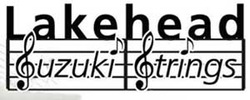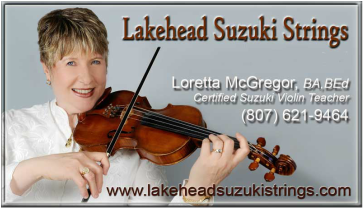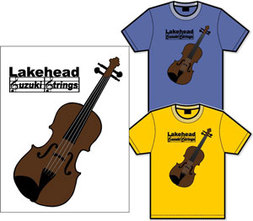Q. What materials will I need to start lessons?
With a beginner, age 4 to 6, here is what you need:
Depending on the age of your child, he may be starting with a box or "pretend" violin. Discuss this with your teacher.
Q. What is the Suzuki Method of Training?
Answered by Shinichi Suzuki
Although the following excerpt is from a brochure by Shinichi Suzuki titled "How to Teach Suzuki Piano," it speaks to every parent and teacher, regardless of what instrument they may deal with, about the principles of the Suzuki method which form the foundation for all instruction. He expresses his own personal philosophy which then guides parents and teachers as they introduce the specific technical musical concepts applying to various instruments.
With a beginner, age 4 to 6, here is what you need:
- A Suzuki Violin School Music Book, Volume 1 (revised edition) with a Suzuki Book 1 CD
- A CD player on which to play the recording (ear phones may be a definite asset).
- A notebook or binder to take clear notes during your child's lesson.
- A space at home in which to practice. (Living room, kitchen, etc.)
Depending on the age of your child, he may be starting with a box or "pretend" violin. Discuss this with your teacher.
Q. What is the Suzuki Method of Training?
Answered by Shinichi Suzuki
Although the following excerpt is from a brochure by Shinichi Suzuki titled "How to Teach Suzuki Piano," it speaks to every parent and teacher, regardless of what instrument they may deal with, about the principles of the Suzuki method which form the foundation for all instruction. He expresses his own personal philosophy which then guides parents and teachers as they introduce the specific technical musical concepts applying to various instruments.
|
The Use of Musical Scores
Because I often receive questions about teaching children to read music, I would like to explain my thinking and approach on this subject. The ability to read music is one important aspect of musical ability. However, the printed score must never be confused with music itself; it is nothing but a symbol of it. I believe that true music reading means discovering the composer's musical idea and expressing it aloud in a beautiful manner. For example, everyone recognizes a speaker of the Osaka dialect because he uses a special lilt, nuance, and accent characteristic of that region. When a person from Tokyo reads a transcribed version of Osaka dialect, this is not the same as real Osaka dialect because it lacks that special lilt. Nobody teaches a baby to talk by starting with printed letters and words. The natural order is to teach letters and reading after a child learns to talk. In the same manner, in teaching preschool children, we do not use printed music, but rather have them learn new songs from listening to the record and showing them how to play. Mothers should be taught to read music, however, because they need this skill to help their children practice. Music is an Aural Art Because music is something that we appreciate aurally, it is important to teach it as an aural medium. When using one's eyes, the ears are less attentive. If you play in the dark, you become more aware of different musical inflections and nuances. The habit of practicing while reading music lowers students' aural sensitivity and they tend to not listen to their own playing, in the manner of a typist. Please teach mothers to read music so that they can help their children learn new pieces, but wait to teach the students until an appropriate age and time. Until that time, I think that it's more important to develop the ear so that children listen to and judge their own sound, use an expressive forte and piano, and have a fine sense of tempo and rhythm. The goal of instruction is to develop students who depend upon the sound of a piece rather than upon a musical score. Later, after we have taught children to play notes from looking at a musical score, we must teach them the habit that once they have learned a piece from a score, they should continue to study and perform the piece from memory. In my own teaching, I only assist students with that part of the piece which they can play from memory. If one uses this method until it becomes a habit for the students, it develops their memory and gives them the ability to play without a musical score. The Ability to Memorize Quickly In my teaching experience, some very diligent and highly developed students have been able to learn and memorize in one week long and difficult works such as the first movement of the Sibelius violin concerto, the entire Tchaikovsky concerto, or the first movement of the Brahms violin concerto. Most advanced students are able to do this. This type of ability is much less likely to be developed in a student who always relies on a musical score. It is very important to remember the goal of developing in students the ability to quickly memorize and play pieces with confidence once they have learned them from a musical score. I do not believe that reading music is unimportant, but as in the relationship between letters and sentences, I believe that it is also necessary to develop the abilities which underlie reading music. This means that the teacher should first explain musical notation to the mother and teach her how to read the score. The child should listen often to the record, and if there are difficult passages, the mother gives assistance. In this way, the child will come to play musically, listening to his or her own sound and musical expression. If such powers of discrimination are developed, when children do use a musical score, they will be able to do so to produce real music. It is also probably necessary to practice sight reading. However, this comes after the child's basic ability has been developed, as mentioned above. If students have fine musical understanding and sensitivity they will be able to catch the real music from the musical score, which is after all the true meaning of reading music. |
Q. Can Musical Training Benefits Kids' Brains?
Young children who got a year of musical training outside school showed brain changes and superior memory compared with children who did not receive the instruction, according to a small new study published yesterday that followed a group of Canadian children.
Six children who took Suzuki lessons had larger and faster brain responses to musical stimuli compared with six children who had no lessons, based on measurements by a magnetoencephalograph, a device that monitors brain wave activity.
Besides having faster and larger brain responses to violin notes compared with the children who did not get the lessons, the musically trained children showed much more improvement on a test of general mental ability.
The study of children 4 to 6 years old is the first to show specific cognitive benefits from musical training among the very young.
The researchers studied the effects of the popular Suzuki method because different Suzuki instructors all follow the same steps and because students are not selected on the basis of innate musical ability or mental skills.
"It is very interesting that the children taking music lessons improved more over the year on general memory skills that are correlated with nonmusical abilities such as literacy, verbal memory, visiospatial processing, mathematics and IQ than did the children not taking lessons," said Laurel J. Trainor, the lead researcher of the study at McMaster University in Canada. The study is being published in the journal Brain.
VITAL EVIDENCE Washington Post Wednesday, September 20, 2006; Page A02 — Shankar Vedantam
Read on.....
Music lessons can improve memory and learning ability in young children by encouraging different patterns of brain development, research shows.
Canadian scientists compared children aged four to six who took music lessons for a year with those who did not. They found the musical group performed better on a memory test also designed to assess general intelligence skills such as literacy and maths ability. The study, by McMaster University, is published online by the journal Brain.
The researchers also measured changes in the children's brain responses to sounds during the year. They found changes developed in the musical group in as little as four months. Previous studies have shown that older children given music lessons recorded greater improvements in IQ scores than children given drama lessons.
But lead researcher Professor Laurel Trainor said: "This is the first study to show that brain responses in young, musically trained and untrained children change differently over the course of a year."
Brain measurements
The researchers focused on 12 children, six of whom attended a Suzuki music school, using a Japanese approach which encourages children to listen to and imitate music before they attempt to read it. The other six had no music lessons outside school. They measured brain activity using a technique called magnetoencephalography (MEG) while the children listened to two types of sounds: a violin tone and a white noise burst.
All the children recorded larger responses when listening to the violin tones compared with the white noise - indicating more brain power was being deployed to process meaningful sounds. In addition, all children responded more quickly to the sounds over the course of the year of the study - suggesting a greater efficiency of the maturing brain.
However, when the researchers focused on a specific measurement related to attention and sound discrimination, they found a greater change over the year among the Suzuki children. Professor Trainor said this difference, coupled with the better performance of the Suzuki children in the memory test suggested musical training was having a profound impact. He said: "It suggests that musical training is having an effect on how the brain gets wired for general cognitive functioning related to memory and attention."
Dr Takako Fujioka, of the Baycrest's Rotman Research Institute, also worked on the study. He said: "It is clear that music is good for children's cognitive development and that music should be part of the pre-school and primary school curriculum."
Young children who got a year of musical training outside school showed brain changes and superior memory compared with children who did not receive the instruction, according to a small new study published yesterday that followed a group of Canadian children.
Six children who took Suzuki lessons had larger and faster brain responses to musical stimuli compared with six children who had no lessons, based on measurements by a magnetoencephalograph, a device that monitors brain wave activity.
Besides having faster and larger brain responses to violin notes compared with the children who did not get the lessons, the musically trained children showed much more improvement on a test of general mental ability.
The study of children 4 to 6 years old is the first to show specific cognitive benefits from musical training among the very young.
The researchers studied the effects of the popular Suzuki method because different Suzuki instructors all follow the same steps and because students are not selected on the basis of innate musical ability or mental skills.
"It is very interesting that the children taking music lessons improved more over the year on general memory skills that are correlated with nonmusical abilities such as literacy, verbal memory, visiospatial processing, mathematics and IQ than did the children not taking lessons," said Laurel J. Trainor, the lead researcher of the study at McMaster University in Canada. The study is being published in the journal Brain.
VITAL EVIDENCE Washington Post Wednesday, September 20, 2006; Page A02 — Shankar Vedantam
Read on.....
Music lessons can improve memory and learning ability in young children by encouraging different patterns of brain development, research shows.
Canadian scientists compared children aged four to six who took music lessons for a year with those who did not. They found the musical group performed better on a memory test also designed to assess general intelligence skills such as literacy and maths ability. The study, by McMaster University, is published online by the journal Brain.
The researchers also measured changes in the children's brain responses to sounds during the year. They found changes developed in the musical group in as little as four months. Previous studies have shown that older children given music lessons recorded greater improvements in IQ scores than children given drama lessons.
But lead researcher Professor Laurel Trainor said: "This is the first study to show that brain responses in young, musically trained and untrained children change differently over the course of a year."
Brain measurements
The researchers focused on 12 children, six of whom attended a Suzuki music school, using a Japanese approach which encourages children to listen to and imitate music before they attempt to read it. The other six had no music lessons outside school. They measured brain activity using a technique called magnetoencephalography (MEG) while the children listened to two types of sounds: a violin tone and a white noise burst.
All the children recorded larger responses when listening to the violin tones compared with the white noise - indicating more brain power was being deployed to process meaningful sounds. In addition, all children responded more quickly to the sounds over the course of the year of the study - suggesting a greater efficiency of the maturing brain.
However, when the researchers focused on a specific measurement related to attention and sound discrimination, they found a greater change over the year among the Suzuki children. Professor Trainor said this difference, coupled with the better performance of the Suzuki children in the memory test suggested musical training was having a profound impact. He said: "It suggests that musical training is having an effect on how the brain gets wired for general cognitive functioning related to memory and attention."
Dr Takako Fujioka, of the Baycrest's Rotman Research Institute, also worked on the study. He said: "It is clear that music is good for children's cognitive development and that music should be part of the pre-school and primary school curriculum."



